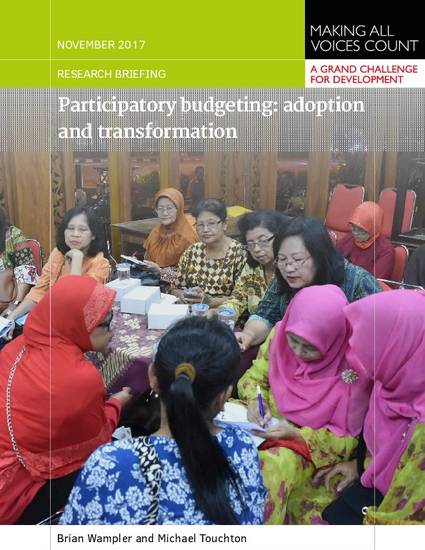
Other
Participatory Budgeting: Adoption and Transformation
(2017)
Abstract
Participatory budgeting programmes are spreading rapidly across the world because they offer government officials and citizens the opportunity to engage each other in new ways as they combine democratic practices with the ‘nitty gritty’ of policy-making. The principles and ideas associated with participatory budgeting appeal to a broad spectrum of citizens, civil society activists, government officials and international agencies, which helps explain why it is so popular and has expanded so quickly.
In this research briefing, we focus on adoption and transformation of participatory budgeting in several low- and middle-income countries where international donors are active. We are particularly interested in better understanding how participatory budgeting is transforming in countries where international donors are active, where states struggle to provide public services, and where urban and rural communities are characterised by high levels of poverty.
Our July 2017 workshop, held in Kenya, brought together seven professionals from non-governmental organisations (NGOs) affiliated with Making All Voices Count’s programme of research and innovation on accountable and responsive governance, all of whom are highly knowledgeable about their country’s experience with participatory budgeting. We identified key transformations and adaptations in the participatory budgeting field based on our close work with these professionals, who are based in Indonesia, Kenya, Mozambique, the Philippines, Senegal, South Africa and Uganda.
Three key shifts stand out across the countries involved in Making All Voices Count. First, participatory budgeting is now being adopted in villages and rural environments that often have fragile local states. Second, such programmes are now more likely to use consensus-based decision-making models instead of a secret or even a public vote (show of hands). Third, compared with the first wave of programmes in the 1990s, participatory budgeting programmes today are far less likely to use specific rules that promote social justice and mandate the distribution of greater resources to under-served communities.
Keywords
- participatory budgeting,
- social justice,
- redistribution of resources
Disciplines
Publication Date
2017
Comments
Wampler, B. and Touchton, M. (2017) Participatory budgeting: adoption and transformation, Making All Voices Count Research Briefing, Brighton: IDS.
Citation Information
Brian Wampler and Michael Touchton. "Participatory Budgeting: Adoption and Transformation" (2017) Available at: http://works.bepress.com/brian_wampler/64/
Creative Commons license

This work is licensed under a Creative Commons CC_BY International License.
